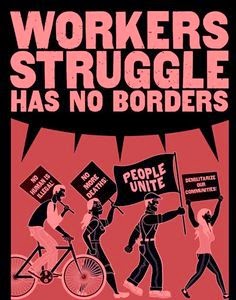Tuesday, May 05, 2015
Monday, May 04, 2015
Voting Revolution
 |
| The Trotskyist Vanguard |
Sunday, May 03, 2015
Liberate Yourself
Saturday, May 02, 2015
All change for no change
Friday, May 01, 2015
Doing It Our Way
Discover Real Socialism
The Socialist Party only contests elections on the "maximum programme" of socialism and nothing else, i.e. without any manifesto of vote-catching reforms to capitalism. This refusal to advocate reforms has been another distinguishing feature of the Party and although not against reforms as such (how could a party composed of workers and committed to the working-class interest be opposed to any measure that improved, however marginally and temporarily, conditions for workers) it opposes reformism in the sense of a policy of actively seeking reforms. Our position is that there is intrinsically nothing wrong with institutions where delegates assemble to parley (parliaments, congresses, councils or soviets). What is wrong with them today is that such parliaments are controlled by the capitalist class. Remove class society and the assemblies will function in the interest of the whole people. Socialism, however, will be a stateless society. The State, which is an organisation composed of soldiers, policemen, judges, and gaolers charged with enforcing the law, is only needed in class society, for in such societies there is no community of interest, only class conflict. The purpose of government is to maintain law and order in the interests of the dominant class. It is in fact an instrument of class oppression.
In Socialism there will be no classes and no in-built class conflicts. The phrase 'socialist government' or 'workers state' is a contradiction in terms. Where there is socialism there is no government and where there is government there is no socialism. As far as the machinery of organisation and administration is concerned, it will be local, regional, national and international, evolving out of existing forms. The Socialist Party proposes that the whole system of money and exchange, buying and selling, profit-making and wage-earning should be entirely abolished and that instead, the community as a whole should organise and administer the production of goods for use only, and the free distribution of these goods to all the members of the community according to each person's needs. The basis of industrial organisation and administration will start from the arrangements existing under capitalism at the time of the transformation, and this will present no difficulties because the socialist movement will already be thoroughly international, both in outlook and practical organisation. The revolutionary transformation of society must be brought about by the will of the great majority of the people if it is to succeed.
May Day Greetings - There is a Better Way - May Day is Our Day
Thursday, April 30, 2015
Liberate the Election
.jpg) |
| TURN THE VOTE INTO AN INSTRUMENT FOR EMANCIPATION |
Wednesday, April 29, 2015
Who needs Polls?
The old believe that the grass is greener on the other side certainly appears to apply to the vast majority of voters. They think that if the party of their choice is elected then they would be spared the many problems created by the capitalist system. And they haven't noticed that despite the promises of the politicians down the years the problems remain and may even get worse.
The recent referendum revealed that a great many people in Scotland think that a nationalist government would be the solution but nationalist governments all over the world have shown that they are powerless to avoid the problems, the plain fact is that governments of all kinds cannot dictate what the capitalist system does, it is the system which determines what governments do, and whatever the result of this election this will be demonstrated once again.
Shouldn't elections be about real choice
Tuesday, April 28, 2015
Blowing Up Balloons
John Ayer.
Where Are Those Jobs Coming From?
We are not alone, or are we?
The landlords raking it in
Monday, April 27, 2015
No to ReformISM
Sunday, April 26, 2015
Be Reasonable – Demand the Impossible
The richest get richer
-
Right now there are hundreds of campaigns globally for fossil fuel divestment as a strategy in the fight against climate change. Many are pr...








.jpg)
.jpg)

.jpg)




.jpg)








